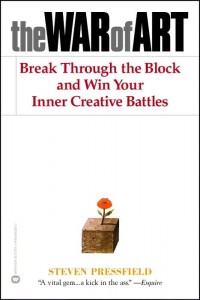Self-Sabotage is Easier than Writing
 A lot of writers I know are pretty good at self-sabotage. It’s not that writing is hard, exactly, except that it is. Physical labor and exercise isn’t required, and it sure doesn’t look like you’re doing much when you’re staring at that screen and pecking away at a keyboard. But getting good work, consistently, means constant effort. And constant effort = work.
A lot of writers I know are pretty good at self-sabotage. It’s not that writing is hard, exactly, except that it is. Physical labor and exercise isn’t required, and it sure doesn’t look like you’re doing much when you’re staring at that screen and pecking away at a keyboard. But getting good work, consistently, means constant effort. And constant effort = work.
I’d like to have those moments where an entire chapter writes itself and stays virtually unchanged through every draft because I can hear, see, and picture it so clearly the first time; but it just doesn’t happen very often. The trick is sticking with the process so that the reader can’t tell which chapters you labored over and which chapters flowed naturally the first time. And that takes time, and effort, and sometimes it’s easier to do nothing.
I’ve learned different ways to practice self sabotage over the years, and different ways to fight my tendencies. I know that the best way to get started every day is to allow myself a transitional moment – check a couple of e-mails and respond to two, say, or play a game of mine-sweeper, and then get to business. It is so, so, so much easier to notwrite than it is to write, and it’s incredibly easy to go to a news site, check a few headlines, then notice a few other interesting articles while you’re reading those, then have those articles remind you that you never knew what year Green Lantern was invented, or how many drummers the Rolling Stones had or some other tidbit completely unrelated to anything productive you need to get done.
 Steven Pressfield’s excellent book on Writing, The War of Art, calls this Resistance. Different writing tips work better for different writers because we all have varied strengths and weaknesses, but I found Presfield’s book a revelation, and swore that I would defeat the enemy now that I understood it. Unfortunately, you never vanquish Resistance. It’s like that damned fox from Dora the Explorer. If you’re not looking, your time is swiped, and it’s your own fault. You just have to stay vigilant. One of the ways I stay vigilant is with the Dr. McCoy test, but you may have your own methods.
Steven Pressfield’s excellent book on Writing, The War of Art, calls this Resistance. Different writing tips work better for different writers because we all have varied strengths and weaknesses, but I found Presfield’s book a revelation, and swore that I would defeat the enemy now that I understood it. Unfortunately, you never vanquish Resistance. It’s like that damned fox from Dora the Explorer. If you’re not looking, your time is swiped, and it’s your own fault. You just have to stay vigilant. One of the ways I stay vigilant is with the Dr. McCoy test, but you may have your own methods.
That’s an old enemy, and an old battle. It was my wife who showed me I was battling another. Two years ago I woke up one Saturday and sat down to revise the first chapter of the third Dabir and Asim novel. When I woke my wife a few hours later (as requested, so we’d arrive for an appointment) she asked how things had gone, and I told her that I’d finished another pass on chapter 1, and that I was really looking forward to getting back to writing new chapters. She thought about my response for a while, then asked why I was always excited when I made progress on the rough draft, but not pleased when I revised it. She pointed out that being excited about 2000 words when 1000 of them might change was sort of delusional, whereas being pleased when a chapter started to sound good might be more healthy.
 She’s a wise lady, and so I mulled that over. I always allow myself a feel good moment when I meet my daily minimum word count, so why didn’t I pat myself on the back that morning when I wrestled chapter 1 into near final condition?
She’s a wise lady, and so I mulled that over. I always allow myself a feel good moment when I meet my daily minimum word count, so why didn’t I pat myself on the back that morning when I wrestled chapter 1 into near final condition?
I thought of four reasons.
- For years, revising was easier for me than drafting, so I’ve trained myself to be more excited when drafting goes well.
- Long ago I used to stop after a few chapters and revise and revise until I’d get sick and give up completely, and I swore I wouldn’t do that anymore.
- It feels better to have the work approaching the completed stage, especially when you’re under deadline.
- It is challenging to switch gears between rough draft and revising.
They all make sense to me, but they’re all excuses. With a good outline in hand, drafting is no longer as challenging. I’ve long since given up the bad practice of “looping” over and over and then giving up. The other two are states of mind.
So what’s to be done?
When I originally wrote this article in 2012 (at Black Gate), I wasn’t sure. I answered that question with: “I’m not completely sure, but I have a plan in mind. The next time I’m feeling grumbly that I’m not making progress, I’ll try to remember that there are different ways to measure it.”
The plan worked. I allow myself to feel good as long as I’m making progress. And as I mentioned yesterday, a lot of it has to do with two things: my new outlining process and the simple matter of acquired experience. Some writers acquire that experience faster than I did — and more power to them — but I seem to have it now.
There’s a third thing, though. And that’s to be kinder to myself as a writer. I don’t mean to say to be arrogant, or non-critical. You always have to be your first critic. But I’ve allowed myself to celebrate, a little, when I get a chapter sounding right, or when I come up with a phrase that pleases me. There seem to be an endless supply of people out there waiting to tear you down for reasons that may or may not have any basis in reality, so why go out of your way to beat your own writing up?
Right, well, off the soapbox and back to work. Horses to feed, breakfast to eat, words to write.
3 Comments